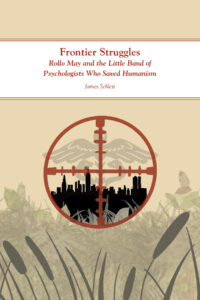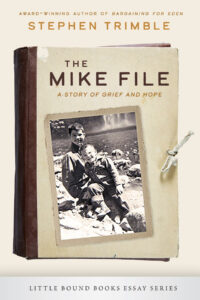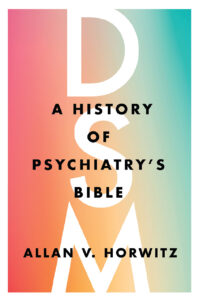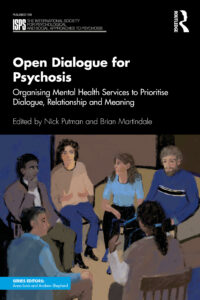Frontier Struggles: Rollo May and the Little Band of Psychologists Who Saved Humanism by James Schlett (University of Akron Press)

In the mid-20th century, an existential crisis gripped psychology: What was it, and who could practice it? Should therapy be the province of psychiatry alone? Or should—more to the point, could—psychologists be certified or even licensed by the state, receiving an official stamp distinct from psychiatry and medicine?
They could and they did. But the battles over a licensing bill in New York State were long and fraught, marked by the slow grind of policy and behind-the-scenes machinations. In James Schlett’s thorough and straightforward accounting of that process, turf wars pitting psychiatrists versus psychologists are a major piece of the story. So is the usual alliterative mix fueling any political history: propaganda, publicity, power, personality conflicts, playing dirty, prestige. But beyond the professional tensions and the holy mess of lawmaking, the book also considers the yawning philosophical divide between the whole-self mindset of humanist psychologists and the more mechanistic, disease-model approach of psychiatrists.
Rollo May himself—a prominent existential psychologist, author of Man’s Search for Himself, and, eventually, head of the Joint Council of New York State Psychologists on Legislation—is less the book’s crusading protagonist than one in a rotating crowd of key personalities. (Frankly, I longed for a Tolstoy-esque list of characters to keep them all straight.) Move by move, Schlett follows the psychologists’ efforts to define their work as a recognized profession and, simultaneously, the medical establishment’s efforts to establish themselves as the only ones officially sanctioned to provide mental care. May, Schlett says, “called this ‘the physicians’ narcissism’ that drove the thinking that ‘nobody can treat anybody for anything except a physician.’”
After NYS finally passed its licensing law in 1956, more states followed suit with similar legislation. That wave “coincided with a significant divergence in the direction of psychology and psychiatry,” Schlett says in the book’s conclusion. “For psychologists, there was the movement away from the mechanical view of people. . . . and toward a more humanistic psychology. For psychiatrists, there was the shift away from psychodynamics” toward the biological model.
As May himself put it: “We won our battle against the whole AMA. . . We won it because people underneath realized we had something to give that wasn’t the customary, technical prescribing, but rather it was hearing human beings.”
*****
The Mike File by Stephen Trimble (Little Bound Books)

The Mike File is a little book, only 4×6 inches and 143 pages long. The story it tells is just as compact, focusing on one soul lost to the psychiatric system.
But intimate tales are windows into universal truths, and this one is as searing and powerful as it is small. Stephen Trimble’s subject is his late half-brother, Mike, who was diagnosed with paranoid schizophrenia at a Denver hospital in 1957, at age 14, “and then shipped off to the state hospital in Pueblo for what surely felt like punishment, incarceration.”
Stephen was then 6. As a boy, he explains, he never focused much on his brother’s hospitalization, his release two years later into a Denver treatment center for young people with intellectual disabilities—his first diagnosis—or his ongoing struggles until his lonely death at 33. But in the decades that followed, Mike’s absence loomed, finally launching Trimble on a quest to “look into my brother’s eyes” and face what happened with compassion. He interviewed family members and psychologists, scoured school reports, and pored over the titular file of letters, medical records, and other documents collected by their parents. “Everybody else is alright,” Mike writes in one of them. “I am just a worthless piece of junk.”
In unfolding his family history, Trimble also touches on the history of American psychiatric treatment, noting John F. Kennedy’s legislative pushback against “the cold mercy of custodial isolation” and the turning tide against long-term hospitalization. But he adds: “The hospitals emptied. Without stable funding for alternative treatment in communities, deinstitutionalizing led to epic homelessness and incarceration. Our mental health treatment fails our families even today.”
Trimble, an accomplished nature photographer and author of 25 books, is not anti-psychiatry or anti-medication. But he questions the existing system, seeing the horror in how things stand: the stripping-away of not just rights but agency, community, even humanity, denying the plainest recognition that Mike and those like him are deserving of a place in the world.
At the end, the author ponders the might-have-beens. What might have happened, in an alternate timeline, had his brother found more compassionate and inclusive care? “Surely in this different world,” he writes, “Mike may not have been as disabled—and dismissed and sidelined—by his condition.” The parallel vision he lays out, starkly and simply, concludes this little book with epic longing.
*****
DSM: A History of Psychiatry’s Bible by Allan V. Horwitz (John Hopkins University Press)

The Diagnostic and Statistical Manual of Mental Disorders is not, according to Allan V Horwitz, etched in stone. It’s not some holy writ handed down from high. Except for one thing: it’s treated that way.
“Its unchallenged position in the United States and, increasingly, globally has led the DSM to be called the bible of psychiatry. In fact, it is anything but inerrant scripture,” he writes at the outset of DSM.
As he explains in the pages that follow, the American Psychiatric Association’s guide to classifying and codifying diagnostic labels has shaped not merely the profession—and its emphasis on drugs—but the general population as well, with ever-larger chunks of society reporting anxiety and mood disorders. “The use of DSM diagnoses thus makes it seem,” he writes, “as if mental disorders are rampant.”
Horwitz, an emeritus sociology professor at Rutgers, is also the author of Creating Mental Illness and histories of anxiety and PTSD. His close look at the DSM is a meticulous blow-by-blow, tracking its evolution in the context of shifting psychiatric care, expanding disease taxonomy, growing pharmaceutical influence, emerging social movements, and a diverse array of personalities and identities (trans, queer) classified as disorders. From the first edition in 1952 to the latest, DSM-5, in 2013, he follows the handbook’s growth in scope and sprawling impact as it morphed “from a minor and rarely used volume to an authoritative classification with huge influence both inside and outside of psychiatry.”
Throughout, Horwitz questions the psychiatric establishment’s fixation on symptoms and disregard for human context (circumstances, experiences); he also recognizes the harm endured by many in treatment. At the same time, he issues a grim portent to those critical of the medical paradigm and calling for change. “These critics are unlikely to succeed,” he says. “Regardless of their validity, these arguments are likely to hold little weight in the face of the substantial benefits that DSM diagnoses reap for many groups.”
Near the end, he adds: “Patients require its diagnoses to obtain treatment, clinicians to get reimbursement, insurance companies to make payments, schools to provide services, government programs to decide eligibility, and drug companies to market products. Perhaps most importantly, the current DSM fulfills psychiatry’s need for professional legitimacy.”
It’s their bible, and they thump it.
*****
Open Dialogue for Psychosis: Organising Mental Health Services to Prioritise Dialogue, Relationship and Meaning by Nick Putman and Brian Martindale (Routledge)

This isn’t simply a book. As befits the topic, it’s a conversation—a polyphony of voices on the history, principles, training, practice, challenges, experiences, and global applications of the dialogue-based, psychosocial approach to mental healthcare first developed in Finland’s Western Lapland in the 1980s. While editors Nick Putman (who founded Open Dialogue UK) and Brian Martindale (former chair of the International Society for Psychosocial and Social Approaches to Psychosis) are named on the cover and contribute several chapters, it’s as much a book embodying Open Dialogue as a book about it, its diverse essays underscoring the power of colloquy itself.
In OD, we learn, community and open communication form the basis of its response to those experiencing psychosis (and, in Finland, other mental-health crises). At its core are network meetings involving the “person at the center of concern” along with family members, healthcare staff, and other relevant people. Perspectives count; relationships matter; transparency is essential; and no one is silenced for being in pain. Further, hallucinations or other psychotic episodes are regarded not as an excuse to drug someone but a reason to ask what happened to them—likely some trauma.
“In OD psychotic behaviour is not regarded as a distinct set of categorical phenomena, as in an illness,” writes Jaakko Seikkula, one of its founders. Instead, it’s a way for the mind “to cope with experiences that are so ‘heavy’ that it has been impossible to construct a rational spoken narrative.”
Main themes come to the fore: openness, flexibility, mobility, tolerance for uncertainty, and other foundational principles. At times, with input from those with lived experience, Open Dialogue reads like an oral history; at other times, with essays by researchers and practitioners from around the world, it’s a more studied analysis of OD’s successes, practical implementation, and logistical challenges in countries with healthcare systems (say, the US) hemmed in by insurance companies and the medical model.
All of this lends a sense of mission, passionate but pragmatic, to the entire volume. As Martindale writes in his epilogue: “We both hope that the book will play a significant part in transforming the image of OD as being largely connected to, and thus a peculiarity of, a small part of Finland to one of OD being of great import to the wider international mental health field.”





It’s hard to comment on 4 book reviews, that seemingly have little do with one another, in one book review. And writing such a book review strikes me as quite disrespectful to the authors of those books.
I’m a little surprised a writer would be so disrespectful to other writers. But I do know, psychologically trained visual artists, will try to steal everything from other visual artists, in this society controlled by the wrong people, via the wrong ways.
As the Holy Bible properly warned us, “the love of money is the root of all evil.”
Report comment
Someone Else: Amy Biancolli did this round-up of books at my request. It is, in fact, quite common for magazines, newspapers, and so forth, to gather reviews of multiple books into a “round-up” like this one. It’s really four separate reviews, and I can assure you that authors of books are happy to get their books reviewed as part of a round-up. This is a way to introduce more books of interest to MIA Readers.
Report comment